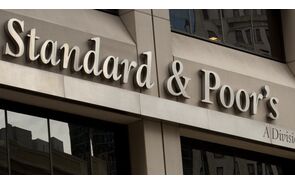A Crise Financeira, o Crash e os Baby Boomers.
A Wal-Mart e a Home Depot, os maiores retalhistas dos EUA, relativamente às perspectivas para o resto do corrente ano, afirmaram que a retracção do mercado imobiliário e a subida dos incumprimentos no crédito terão implicações no crescimento dos seus lucros. Estas empresas reportam dificuldades por parte dos consumidores que ficam sem orçamento doméstico antes do final do mês.(in Gobulling)
- Mensagens: 509
- Registado: 9/8/2005 11:17
- Localização: 17
Atomez Escreveu:Estes agora dizem que a culpa é do computador !!!Goldman in $3bn bailout of fund
Goldman Sachs is to use $2bn of its own money to bail out its Global Equity Opportunities hedge fund in an embarrassing admission that its highly regarded computerised funds malfunctioned last week.
The investment bank has raised a further $1bn from outside investors to support the $3.6bn GEO fund, which lost about $1.5bn when computer models failed to predict market turbulence.
Goldman, the second-largest hedge fund manager, said its computer-driven, or quantitative, funds had been hit by unpredictable price movements as rivals with similar strategies dumped shares to cut their borrowing.
Esta explicação do Earnings Whispers sobre a falha na gestão por computador, parece-me simples e clara:
Quantitative long/short hedge funds have been in the news recently. These are funds that have developed statistics and algorithms that buy stocks when certain criteria are met, such as those mentioned above (though it is more complex than that) and sell when there are negative indications. Over the past several years, a number of these hedge funds, and those that develop black box systems to sell to hedge funds, have come to us for research and data for trading around an earnings release. The simple fact is, most of these quantitative strategies don't work around an event and we believe most of the hedge funds that use these strategies just stop trading a stock around its most common event the earnings release.
For the quantitative long/short hedge fund managers, it is the worst of times, because this entire market is being driven by events and headlines. If all the bad news is behind us, we believe it will be the best of times again and the market will continue moving higher, but unfortunately we believe there is more bad news to come. Look for news or at least an earnings impact to hit Morgan Stanley since they are to quantitative hedge funds as Bear Stearns is to fixed income hedge funds.
E mais esta, bem frequinha
Market Update Set Alert
ADVERTISEMENT
11:00 am (NY): The market continues to deteriorate as speculation about a letter to clients from a money market fund halting redemptions is confirmed. Within the last 10 minutes, CNBC reported that Sentinel Management Group has asked permission from the CFTC to halt money market redemptions.
Sentinel's inability to meet significant redemption requests has exacerbated the liquidity concerns that have led many to believe a real credit crunch is forthcoming. While the credit markets continue to experience liquidity problems, which are real and of serious concern to the financial markets, there is no evidence yet of a credit crunch that would impact the overall economy. Nonetheless, the Financial sector has edged even lower and is now down 1.9% as the bottom continues to fall out of the brokers and banks. DJ30 -147.38 NASDAQ -24.26 SP500 -18.55 NASDAQ Dec/Adv/Vol 1645/1099/448 mln NYSE Dec/Adv/Vol 2169/867/380 mln
ADVERTISEMENT
11:00 am (NY): The market continues to deteriorate as speculation about a letter to clients from a money market fund halting redemptions is confirmed. Within the last 10 minutes, CNBC reported that Sentinel Management Group has asked permission from the CFTC to halt money market redemptions.
Sentinel's inability to meet significant redemption requests has exacerbated the liquidity concerns that have led many to believe a real credit crunch is forthcoming. While the credit markets continue to experience liquidity problems, which are real and of serious concern to the financial markets, there is no evidence yet of a credit crunch that would impact the overall economy. Nonetheless, the Financial sector has edged even lower and is now down 1.9% as the bottom continues to fall out of the brokers and banks. DJ30 -147.38 NASDAQ -24.26 SP500 -18.55 NASDAQ Dec/Adv/Vol 1645/1099/448 mln NYSE Dec/Adv/Vol 2169/867/380 mln
Bulls a ganhar??!!
Verdade, verdadinha que os bulls, para já, parecem estar a perder mais uma batalha (espero que não a guerra). E razões para isso não faltam:
- Crescimento da zona euro abranda mais que o previsto;
- UBS alerta para queda provável dos seus lucros;
- Goldman Sachs anuncia injecçao de 1,46 mil milhões de dólares num dos seus fundos;
- Uma empresa de crédito hipotecário de risco norte-americana declarou ontem falência.
Como se isso não bastasse, às 15.00h (Lisboa), foi a notícia do Citi:
Crise no mercado de crédito hipotecário norte-americano 2007-08-14 14:59
Citigroup poderá perder 3 mil milhões de dólares com crise no mercado de crédito.
Os analistas prevêem que a maior instituição bancária dos Estados Unidos em termos de contas bancárias poderá perder pelo menos perto de 3 mil milhões de dólares no segundo semestre deste ano devido à crise no mercado de crédito à habitação de alto risco (subprime).
Tiago Figueiredo Silva
Segundo avança o site Invertia, o Citigroup poderá perder entre 1,2 e 1,5 mil milhões de dólares derivados de investimentos em fundos relativos ao mercado hipotecário, e entre 500 e mil milhões de dólares nos pagamentos de hipotecas de alto risco, de acordo com as previsões dos analistas da Sanford C. Bernstein & Co.
- Crescimento da zona euro abranda mais que o previsto;
- UBS alerta para queda provável dos seus lucros;
- Goldman Sachs anuncia injecçao de 1,46 mil milhões de dólares num dos seus fundos;
- Uma empresa de crédito hipotecário de risco norte-americana declarou ontem falência.
Como se isso não bastasse, às 15.00h (Lisboa), foi a notícia do Citi:
Crise no mercado de crédito hipotecário norte-americano 2007-08-14 14:59
Citigroup poderá perder 3 mil milhões de dólares com crise no mercado de crédito.
Os analistas prevêem que a maior instituição bancária dos Estados Unidos em termos de contas bancárias poderá perder pelo menos perto de 3 mil milhões de dólares no segundo semestre deste ano devido à crise no mercado de crédito à habitação de alto risco (subprime).
Tiago Figueiredo Silva
Segundo avança o site Invertia, o Citigroup poderá perder entre 1,2 e 1,5 mil milhões de dólares derivados de investimentos em fundos relativos ao mercado hipotecário, e entre 500 e mil milhões de dólares nos pagamentos de hipotecas de alto risco, de acordo com as previsões dos analistas da Sanford C. Bernstein & Co.
Fogueiro Escreveu:Vejam como os Bulls acabam por vencer.
Neste caso os Bears são leões e um crocodilo, mas foi o melhor que consegui encontrar…
http://www.youtube.com/watch?v=LU8DDYz68kM&NR=1
...
Vejam como os Bulls acabam por vencer.
Neste caso os Bears são leões e um crocodilo, mas foi o melhor que consegui encontrar…
http://www.youtube.com/watch?v=LU8DDYz68kM&NR=1
...
Neste caso os Bears são leões e um crocodilo, mas foi o melhor que consegui encontrar…
http://www.youtube.com/watch?v=LU8DDYz68kM&NR=1
...
mais €€€€
O Banco Central Europeu (BCE) anunciou que vai disponibilizar mais dinheiro no mercado financeiro pelo quarto dia, para evitar uma crise de confiança nos mercados de crédito. "O BCE notou que as condições do mercado monetário estão agora perto do normal" defende a autoridade num comunicado citado pela Bloomberg. "Contudo, com esta operação de ajuste, o BCE oferece ainda a oportunidade de cobrir qualquer necessidade de liquidez que permaneça", adianta. O comunicado citado pela Bloomberg não adianta o valor disponibilizado hoje. Esta medida surge depois do BCE já ter disponibilizado 203,5 mil milhões de euros no mercado com o objectivo de combater a carência de liquidez. O presidente do BCE, Jean-Claude Trichet, disse sexta-feira que a autoridade monetária está a prestar "grande atenção aos mercados", estando a providenciar os fundos suficientes para evitar um esmagamento de crédito.
" os homens mentiriam muito menos, se as mulheres fizessem menos perguntas "
Bons negócios
EA
Bons negócios
EA
Fogueiro Escreveu:Deve ter sido o que compraram ao BCP em 2ª mão depois da AG...
Ou então contrataram o De Beck para PR...
Eis uma explicação de como funciona isso dos equity market neutral funds:
Hedge funds forced into equities fire sale
Goldman Sachs has made the announcement that everyone has been waiting for. The investment bank admitted yesterday that three of its high-profile hedge funds had off-loaded massive equity holdings following days of stock market turbulence.
In recent days, whispers at rival fund managers had blamed a fire sale at Goldman Sachs for the devastating downward spiral afflicting global financial markets. The truth is that the bank was not alone. Almost every big quantitative fund using a strategy similar to Goldman’s – known as an equity market neutral (EMN) strategy – was suffering in its own way.
The result has been a rout of one of the most popular types of quant fund. Hedge Fund Research’s EMN index had lost 7.6 per cent by last Thursday and undoubtedly saw further points shaved off during Friday’s plunge in equities.
EMN funds make their money by identifying investment opportunities in a specific group of stocks, while neutralising their exposure to the sector. They do this by taking long positions on shares that they expect to out-perform the sector and short positions on those that they expect to underperform.
The managers of the EMN quant funds set the criteria for the share purchases, based on elements such as price/earnings ratios. Once the parameters are set, sophisticated computer programs take over the business of trading. Until last week, City wisdom held that the funds were incapable of producing heavy losses.
One leading fund of hedge funds manager expects EMN’s difficulties to hit the reputation of quant funds as a safe harbour for investors. “Previously they had a reputation of being good protection because they couldn’t make a loss,” the fund manager said. “People know now that that’s not true”.
But experts do not expect the long-awaited hedge fund blow-up to come from the quants. John Godden, chief executive of IGS Group, the hedge fund consultancy, said: “The funds will endure short-term pain but you’re not going to get a meltdown of asset values because they remain in the liquid end of the spectrum. It’s the derivative-linked stuff where you can see the possibility of the values hitting zero.”
Equity quant funds have made strong, stable returns over the past few years, which has attracted the interest of large multi-strategy hedge funds. Big players such as Tykhe Capital, Goldman Sachs and Renaissance Technology have been allocating growing sums to EMN, with increasingly ambitious leveraging. According to Hedge Fund Research, investors pumped an additional $2 billion into ECM funds in the second quarter, taking the total amount invested to $40.7 billion.
In recent weeks, prime brokers have begun to make margin calls – asking their hedge fund clients to put up greater collateral in order to secure their credit lines. To cover their margin calls, the funds were forced to sell some equity assets. Most had invested in the same stocks, concentrating on value investments.
Jerome Berset, an analyst for Capital Management Advisors, the fund of hedge funds, said: “As those big players with huge leverage started to unwind their positions, covering shorts and selling longs, short names started to rally and longs started to fall and it started to hit the market.”
Once the market started to fall, hedge fund managers were pushed to sell more and more equities, at ever-decreasing prices, in order to obtain the cash they required. “Once one guy starts deleveraging, they all have to, and they try to do it more quickly than their neighbours,” a fund of funds manager said.
As pessoas são tão ingénuas e tão agarradas aos seus interesses imediatos que um vigarista hábil consegue sempre que um grande número delas se deixe enganar.
Niccolò Machiavelli
http://www.facebook.com/atomez
Niccolò Machiavelli
http://www.facebook.com/atomez
Estes agora dizem que a culpa é do computador !!!
Goldman in $3bn bailout of fund
Goldman Sachs is to use $2bn of its own money to bail out its Global Equity Opportunities hedge fund in an embarrassing admission that its highly regarded computerised funds malfunctioned last week.
The investment bank has raised a further $1bn from outside investors to support the $3.6bn GEO fund, which lost about $1.5bn when computer models failed to predict market turbulence.
Goldman, the second-largest hedge fund manager, said its computer-driven, or quantitative, funds had been hit by unpredictable price movements as rivals with similar strategies dumped shares to cut their borrowing.
As pessoas são tão ingénuas e tão agarradas aos seus interesses imediatos que um vigarista hábil consegue sempre que um grande número delas se deixe enganar.
Niccolò Machiavelli
http://www.facebook.com/atomez
Niccolò Machiavelli
http://www.facebook.com/atomez
Camilo Lourenço
'Moral hazard'
1987... 1997... 2007. Parece sina. De dez em dez anos (mais mês, menos mês), os mercados financeiros apanham um susto. Embora por razões diferentes. Em 1987 foi o défice da balança comercial dos EUA. Em 1997 foi a crise cambial asiática. Agora é a crise do crédito imobiliário de alto risco. Parece sina... mas não é. É apenas o tempo necessário para os mercados digerirem os excesssos que eles próprios vão criando. Qual o impacto desta crise na economia mundial? Provavelmente pequeno. Porque o
1987... 1997... 2007. Parece sina. De dez em dez anos (mais mês, menos mês), os mercados financeiros apanham um susto. Embora por razões diferentes. Em 1987 foi o défice da balança comercial dos EUA. Em 1997 foi a crise cambial asiática.
Agora é a crise do crédito imobiliário de alto risco. Parece sina... mas não é. É apenas o tempo necessário para os mercados digerirem os excesssos que eles próprios vão criando.
Qual o impacto desta crise na economia mundial? Provavelmente pequeno. Porque os bancos centrais aprenderam com a lição de 1929 (deixam os mercados entregues a si próprios).
Por isso é que já injectaram mais de 150 mil milhões de euros. Porque como esta é uma crise de liquidez, se não faltar dinheiro para acalmar os investidores, em poucas semanas a confiança regressa.
O problema é saber até onde deve ir a intervenção dos bancos centrais. Deve ficar-se pela injecção de liquidez ou baixar os juros? A segunda não é opção. Os bancos centrais ainda não se esqueceram de 1987: quando os mercados acalmaram, não absorveram o excesso de moeda.
E a inflação que daí resultou propiciou a recessão de 1991. Mas há outra razão para não baixar os juros: não premiar o infractor ('moral hazard'). Quem provocou a crise deve fechar portas (se for caso disso). Para não habituar os mercados à ideia de que o crime compensa.
Fonte: www.jornaldenegocios.pt
- Mensagens: 279
- Registado: 8/3/2007 15:37
- Localização: Europa



